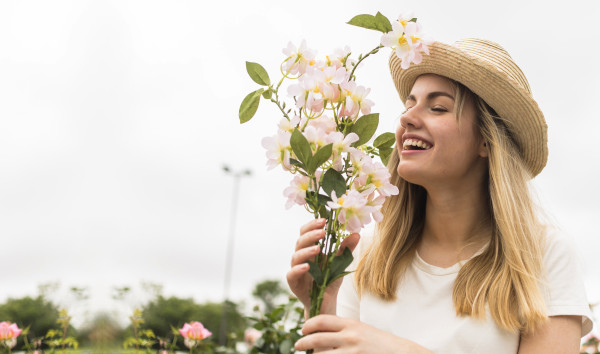

AUGUST: Embracing Joy and Positivity - National Happiness Month
As the warm sun stretches across the sky and the scent of blooming flowers fills the air, August brings with it a special reason to celebrate - it's National Happiness Month! Throughout this joyful month, individuals, communities, and organizations come together to focus on the pursuit of happiness and well-being. The observance of National Happiness Month encourages us to reflect on what brings us joy, appreciate the simple pleasures of life, and make positive changes to enhance our overall well-being.

The Importance of Happiness
Happiness is a universal human aspiration that transcends age, culture, and background. It's a fundamental emotion that contributes to our mental and emotional well-being. Studies have shown that happiness can have a profound impact on various aspects of our lives, including our physical health, relationships, and productivity.
Research has shown that happiness has numerous benefits, both for individuals and society at large. Happy people tend to live longer, experience lower levels of stress, and have better physical and mental health. They also tend to be more productive, creative, and compassionate, contributing positively to their communities. Thus, dedicating an entire month to celebrating happiness is not only a delightful endeavor but also one that holds profound significance.
During National Happiness Month, the spotlight is on the significance of happiness and its role in fostering healthier lives and communities. This observance aims to raise awareness about the importance of emotional well-being and encourage people to prioritize activities and habits that promote happiness.
Why flowers make people happy
Flowers have an enchanting ability to evoke happiness in the human heart. Their vibrant colors, delicate petals, and intoxicating fragrances hold an intrinsic power to uplift spirits and bring smiles to faces. Whether it's a single bloom or a lush bouquet, the presence of flowers has a magical way of brightening up any environment and enhancing our emotional well-being.
The act of giving or receiving flowers is a simple yet profound way to convey emotions and strengthen social connections. It's a gesture that transcends language barriers—touching hearts with its purity and simplicity. The sight of a bouquet of colorful blooms can instantly lighten the mood, trigger smiles, and remind us of the simple pleasures in life.

The Science Behind Our Profound Love for Flowers
From ancient civilizations to modern times, flowers have captured the hearts of humanity with their beauty, fragrance, and symbolism. The allure of flowers isn't just superficial; it's deeply rooted in our psychology, biology, and culture. The intricate relationship between humans and flowers is a testament to the remarkable connection that exists between nature and our emotions. In this article, we delve into the science behind our profound love for flowers and explore the various factors that contribute to this enduring fascination.
Human beings are inherently drawn to beauty, and flowers represent one of the most visually appealing aspects of the natural world. Evolutionary psychologists suggest that our attraction to flowers is rooted in the process of natural selection. Our ancestors who were more attuned to their surroundings had a better chance of survival and reproduction. Thus, those with an eye for vibrant and visually distinctive flowers were more likely to notice potential food sources and identify safe environments. |
 |
 |
The concept of biophilia proposes that humans have an innate connection to nature, including its various elements like plants and flowers. Research has shown that exposure to natural elements, such as flowers, can have positive effects on our mental and physical well-being. Flowers in indoor environments have been linked to reduced stress, improved mood, and enhanced cognitive function. This innate attraction to nature, known as biophilia, helps explain why the presence of flowers can instantly uplift our spirits and contribute to a sense of calm and tranquility. |
The powerful impact of flowers goes beyond their visual appeal. The sense of smell is intricately connected to our memories and emotions due to the brain's limbic system. The colors and scents of flowers have been found to stimulate the release of dopamine, a neurotransmitter associated with pleasure and positive emotions. Studies have shown that exposure to flowers and nature can reduce stress, and anxiety, and even improve mood. The simple act of tending to a garden or arranging a vase of flowers can provide a sense of accomplishment and a therapeutic escape from the demands of daily life. |
 |
 |
Throughout history, flowers have held diverse meanings across different cultures. They have been used to express emotions, commemorate events, and convey messages. For instance, the rose often symbolizes love, while the lotus is associated with purity and enlightenment. The cultural significance of flowers adds layers of meaning to our appreciation of them, turning these blooms into vessels of human sentiment and communication. |
Flower Shops Network’s Happiness Bouquets
|
A burst of joyful blooms. Each blossom within the “Sunshine Giftbox” bouquet is handpicked to represent the sheer joy and positivity of a sunny day. The “Sunshine Giftbox” has the power to turn an ordinary day into a memory that lasts a lifetime
|
the perfect bouquet to give to someone to uplift their spirits. This exquisite bouquet guarantees to give joy to the people around you. The "Blazing Beauty" bouquet is not just a visual delight, it's an experience. As the recipient unwraps the bouquet, the intense colors, and captivating fragrances will instantly evoke emotions and memories, leaving an indelible mark on their heart
|
A radiant symphony of of color and joy. The “Beaming Brights” bouquet is an exquisite arrangement of the most lively and radiant flowers. It showcases a harmonious blend of striking hues that represent the full spectrum of joy.
|



